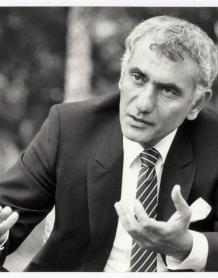Yilmaz Güney, filmmaker, actor and writer

Il est né Yilmaz Pütün le 1er avril 1937 dans un village du sud de l’Anatolie, près d’Adana (Turquie). Son père est un ouvrier agricole d’origine kurde. Yilmaz Pütün travaille très jeune comme porteur d’eau, ouvrier agricole, cueilleur de coton, apprenti-boucher et écrivain public. Il fait néanmoins des études de droit et de sciences économiques à Istanbul et commence à écrire des nouvelles. Il commence en 1958 à jouer au cinéma et devient très vite une grande vedette, jouant dans une centaine de films d’action.
En 1968, il abandonne son statut de vedette et commence à réaliser des films sur des sujets sociaux, influencés par le néo-réalisme italien qui portent pour la première fois à l’écran les Kurdes, le monde paysan, le petit peuple des faubourgs. C'est ainsi qu' « Umut » (L'Espoir, 1970) le fait découvrir en France.
Accusé de propagande communiste et de séparatisme, Yilmaz Güney passe une douzaine d’années en prison après le coup d’État militaire de 1970. Condamné à plus de cent ans de prison pour ses écrits et ses films par la junte militaire turque de 1980, Yilmaz Güney, parvient à s’évader et débarque à Marseille le 15 octobre 1981. Il dépose immédiatement une demande d’asile et est reconnu réfugié.
En France, il se consacre au montage de « Yol » (La permission), un film qui raconte la destinée tragique de cinq prisonniers Kurdes au cours de leur permission. Ce film conçu en détention et dont les rushes ont quitté la Turquie clandestinement obtient la Palme d’or au Festival de Cannes en mai 1982, avant de rencontrer un succès planétaire. En 1983, Yilmaz Güney est déchu de sa nationalité par le gouvernement turc. Il réalise ensuite sa dernière œuvre « Duvar » (Le Mur), un film sur les enfants prisonniers du pénitencier central d'Ankara.
Yilmaz Güney est décédé le 9 septembre 1984. En 1992 ses films sont autorisés en Turquie à condition de censurer les termes « kurde » et « Kurdistan ». En 1995, la levée d'interdiction de son œuvre est officialisée par la projection de ses films majeurs au Festival du cinéma d'Ankara.